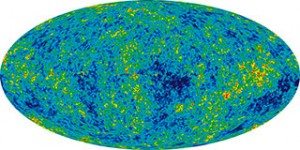
NASA / WMAP Science Team
During the latter half of the 20th century, cosmologists determined that there were three possible scenarios for the end of the universe, and they all depend on its density. If the density were high enough, then gravity would eventually slow the expansion of the universe and cause it to re-collapse in a “Big Crunch.” On the opposite side of the spectrum, a low density would allow the the universe to expand forever. Everything would gradually dim, cool, and spread out in a fate known as the “Big Freeze.” But if the density were just right, then the universe’s expansion would very, very gradually slow down, coming to a complete stop only after an infinite amount of time. This third picture is known as a “flat” universe, and would also end in a Big Freeze.
Images of the cosmic microwave background, relic radiation leftover from the Big Bang, show a universe whose density is very close to the critical density of the latter scenario. So theoretically, the expansion of the universe should eventually stop, right?
Not according to observations first made with the Hubble Space Telescope in 1998. These observations of supernovae in distant galaxies indicate that the universe is expanding at an ever-increasing rate. Cosmologists explain this startling observation with dark energy, a mysterious force that appears to counteract gravity’s pull, instead accelerating the universe’s expansion. The nature of dark energy is one of the most pressing questions in modern cosmology — answering it would provide new insight into the fate of the universe. In one scenario, where dark energy’s negative pressure increases over time, the universe would ultimately rip apart.
Regardless of whether this Big Rip scenario actually takes place, we do know that accelerated cosmological expansion will ultimately carry other galaxies out of our view.
 0
0








Comments
You must be logged in to post a comment.